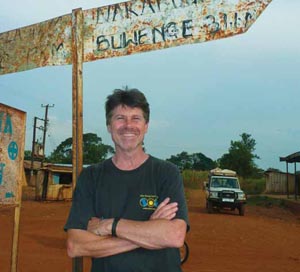Campus News
Alumni Profile / Hal Aronson: Shining a light on women’s health
Hal Aronson toils in a backyard workshop in Berkeley in order to save lives in Africa.

Hal Aronson toils in a backyard workshop in Berkeley in order to save lives in Africa.
What he’s doing seems wildly simple: He is refining a portable solar system that can power LED lights in hospitals and clinics.
But giving doctors the ability to see and treat patients in places where electricity is spotty or nonexistent comes close to a miracle. Listen to Aronson and his obstetrician-gynecologist wife, Laura Stachel, describe scenes of desperate need, and the importance of their work becomes clear.
For instance, they recall the story of a pregnant woman whose uterus had ruptured during labor and was turned away from an African hospital because it was night and doctors could not see well enough to treat her.
“Light is life,” said Aronson simply.
Aronson, who earned a bachelor’s degree in politics (Cowell ’79) and a Ph.D. in sociology from UCSC in 1997, is co-founder with Stachel of a nonprofit called We Care Solar (wecaresolar.org).
Its roots go back to 2008 when Aronson, a self-taught solar engineer, got an email from Stachel, who was part of a public-health research program in Nigeria.
Stachel described having to stand by helplessly while a pregnant woman with a condition readily treatable in the U.S. fought for her life because doctors could not see well enough to aid her.
She asked Aronson if he could help.
“Designing a solution was pretty basic for me,” said Aronson. Within a few weeks, he built a suitcase-sized solar power system, which Stachel could carry on a plane when she returned to Africa.
Four years later, 200 “solar suitcases” have been mounted in clinics and hospitals in 20 countries, with 200 more slated to be installed thanks to a recent grant.
And while statistics on the project’s success are not yet available, the first hospital to receive solar electricity from the couple’s efforts reported its maternal death rate had dropped 70 percent, according to Stachel.
The suitcases, which cost $1,500 each and can power not only lights but also simple medical equipment, have gone through six iterations as Aronson worked to make them more durable and easier to use.
“Make it simple, make it plug-and-play, and make it easy to maintain,” Aronson said. Without those specifications, he said, We Care Solar’s portable energy system might end up like other well-intentioned technology brought to Africa: broken and discarded.
Just back from a trip to Uganda, where Aronson scaled rickety hand-built ladders to install solar panels for units, he said one of the project’s goals is also to train people to maintain them. Not only does that training keep the mini power plants running, but it also provides experience that can lead to better jobs for locals.
This kind of work touches Aronson’s soul. It’s a value he said he learned while at UC Santa Cruz. “There was a great spirit among the students then to create a positive experience in the world,” he said.
Aronson’s UCSC roots run deep: His father is emeritus professor of psychology Elliot Aronson. In addition, his son, stepdaughter, and three siblings also attended UCSC.
Sitting in his cluttered workshop, Aronson told of a doctor who took one of the couple’s power systems to a small village in DR Congo.
The doctor arrived in the middle of a cholera outbreak, which usually would have left 50 to 80 percent of his patients dead. But, because he had light, the physician was able to monitor patients and administer IVs throughout the dark African nights.
All 126 of his patients lived.
When Aronson heard the story, he cried.
Peggy Townsend is a freelance writer based in Santa Cruz.